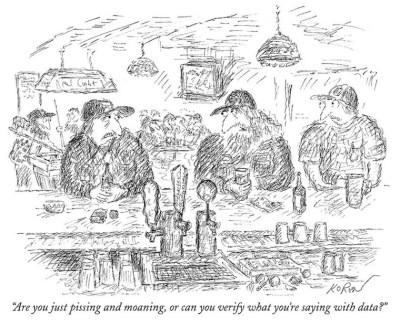From the 2018 cartoon collection Koren in the Wild (my copy of which arrived today), this New Yorker cartoon (published in the magazine on 9/6/99):
Working-class masculinity — the bar, pissing and moaning — meets the intellectual — verify what you’re saying with data: who verifies their pissing and moaning with data?
Then there’s the slang idiom to piss and moan.
(Background on the artist (now 86) — a New Yorker cartoonist since 1962, the (de facto) cartoonist laureate of Vermont — in my 3/9/15 posting “Ed Koren”.)
From OED3 (June 2006) on the verb piss, with all of its cites for the sense ‘complain’:
[piss:] Now chiefly coarse slang.
… 4. intransitive. Originally and chiefly U.S. To complain. Chiefly in to piss and moan.
1947 [implied in: J. H. Burns Gallery vi. 189 The focus of all the pissing and moaning was that Captain Motes was a spineless commanding officer..][AZ: the quote has the PRP form used as a gerundive nominal rather than a verb]
1952 J. Blake Let. 1 Jan. in Joint (1971) 38 It’s no use to piss and moan about it.
1974 E. Thompson Tattoo 237 What’s the Muskrat pissin about now?
1995 Our Times Aug.–Sept. 17/2 The so-called Generation X is only able to piss and moan about the sorry state their parents left the world in.
The 1952 and 1995 cites have the BSE form; GDoS (which offers ‘whinge’ as a BrE gloss, catching the tone of the idiom much better than just ‘complain’) has cites with PRS and PST as well as the very frequent PRP as a progressive verb form (as in the Koren cartoon).
That’s all very well, but no reputable source has any kind of explanation of how piss came to be conjoined with moan in an idiom conveying ‘complain, whinge’. The coordinate idiom would seem to be a kind of amplification of moan, but piss and isn’t used to amplify other verbs.
Maybe we should take seriously the OED‘s idea that ‘complain, whinge’ is simply another sense of piss — so that piss and moan would be an intensifying coordination of two near-synonyms, like scream and shout or leap and jump. GDoS does have, in addition to the 1974 Thompson cite about, this one, from Norman Mailer’s The Naked and the Dead:
Listen, trooper […] you can just quit your pissing.
On the other hand, it’s not at all implausible that the Thompson and Mailer pissing cites are truncations of the much more frequent pissing and moaning; such truncations of idioms are quite common. In fact, unless lots of further early cites of plain piss ‘complain, whinge’ can be found (so that piss and moan can be seen as an intensifying coordination), truncation would be the obvious source for plain piss ‘complain, whinge’.
We’d then want to explore the possibility that piss and originally served as an intensifier for the verb moan — piss and moan ‘really moan, moan a lot’ — the way piss- serves as an intensifier for (many) adjectives: piss-drunk, piss-stupid, piss-poor, piss-ignorant, piss-ugly, etc. (The intensifying effect coming from the use of of the coarse, crude, taboo item piss, an effect seen also in intensifying as hell / fuck / shit / piss: guilty as hell, gay as fuck, stupid as shit, ugly as piss, etc.)

November 24, 2021 at 11:10 pm |
There’s “pissy” in the sense of irritable, but that seems like more of a literal meaning (either ready to piss, as passive-aggressive cats do when annoyed, or else parallel to “mad as a wet hen” as if pissed on). It also seems to overlap with “prissy” in meaning and sound. Similarly, “pissed off” expresses irritation, but the connection to “piss and moan” seems unclear.
November 25, 2021 at 8:06 am |
Tangentially, but addressing another of your interests: Back in the 1980s, when commercial network TV wouldn’t let people say words like “piss” on the air, a character on the show St. Elsewhere advised another character to “stop your whizzing and moaning”. I found this objectionable (and similarly for another instance in which a character – possibly the same one – said he didn’t “give a rat’s can”) on the grounds that someone who didn’t say piss (or ass in public would almost certainly use some other idiom rather than bowdlerizing an “offensive” one.
November 25, 2021 at 9:40 am |
Yes, “whizzing” and “can” are both ridiculous and laughable in the context. Meanwhile, on the tv show Medium there was an episode in which the main character, a woman, gets a visit from her brother in the Army, in company with an Army buddy, during which he needs to take a brief bathroom break. He starts to take his leave by saying, “Excuse me, I need to …” and then clearly fights over the choice between “pee” (avoids coarse language in front of women but fails to maintain masculinity in front of male buddies) and “piss” (socially the reverse), and settles on “take a leak” as getting past on both counts (though “whizz” might have worked as well, but might have been too vivid on the women-and-children front). This is a context where bowdlerizing, done carefully, is ok. But in general you can’t just replace parts of idioms without courting laughter.
December 3, 2021 at 8:35 am |
And then yesterday I read, in a “Talk of the Town” item in the Nov. 1 New Yorker, an actual quotation from an actual person saying “Nobody gives a rat’s patootie about us.” So apparently people really do say things like this.
December 3, 2021 at 9:06 am
It turns out that “(not give a) rat’s patootie” has become a fixed expression all on its own — no doubt because most people experience “patootie” *only* in this expression.